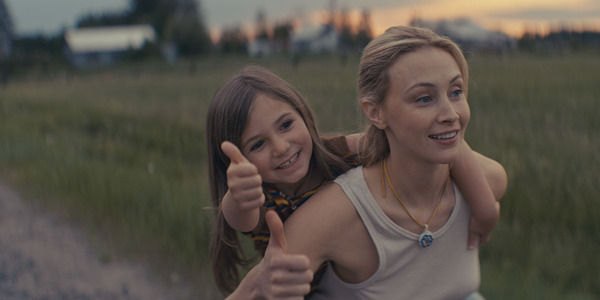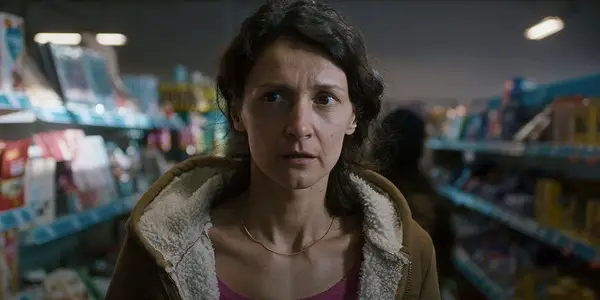TORONTO INTERNATIONAL FILM FESTIVAL 2022: NORTH OF NORMAL & VICTIM

Wilson is a cinema enthusiast based out of Toronto, Canada.…
While the following two films both revolve around motherhood, its central protagonists could not be any more different from one another. In Carly Stone‘s North of Normal, Sarah Gadon plays a charming, yet irresponsible figurehead of motherhood who seems prone to making questionable decisions. This is in comparison to Michal Blaško’s Victim, where Vita Smachelyuk plays a character with strong maternal instincts that are rarely questioned. Both films are screening as part of the 2022 edition of the Toronto International Film Festival.
North of Normal (Carly Stone)

Diving deeper than what could have simply been a straightforward tale of maternal dysfunction, Carly Stone’s North of Normal is a noteworthy example of affectionate storytelling done well. Based on the autobiography of Cea Sunrise Person, the film recounts the life of Cea, who spent her childhood growing up in a Western Canadian wilderness camp run by her maternal grandparents (Robert Carlyle and Janet Porter). Her mother, Michelle (Sarah Gadon) eventually leaves the camp for a more conventional life, bringing Cea with her from one boyfriend to another. The film essentially details their tumultuous journey as wayward inhabitants of an ever-changing world.
While North of Normal may not be the most refined piece of filmmaking, it’s fairly well crafted and feels precise in its approach to narration. In many ways, this is a coming on age story that blends in the added complexities of an unconventional childhood. The type of childhood that Cea goes through is strange to say the least, and her adjustment to a normative society is equally strained. The adults around her are flawed in their own way, and although they too are products of their own environment, the film never curtails to making excuses for the decisions they make. This simplified objectiveness creates an honest perspective that likely reflects the memoir in which the film is based on, translating to a surprisingly unbiased account of events.
And within that objectivity is a clear sense of emotional fortitude, mainly driven by strong performances that really bring a sense of empathy to characters that are naturally flawed. Sarah Gadon – who I should add, is one of Canada’s most talented working actresses – shines the brightest by revealing imperfect maternal instincts through a wholesome, yet misguided gaze. She’s able to draw you in with her radiant personality, but never hides her blemishes either, which tend to be there in plain sight. The result is a character who is at times vilified, and at times redeemed, while always leaving some room for ambiguity. Newcomer Amanda Fix also impresses and never depicts herself as a caricature of a broken child dealt an unfortunate hand. There’s strength in her disposition and a fiery personality that carries the story forward.
The maternal bond between Cea and Michelle is ultimately what holds the film together, transforming a somewhat conventional story into something that feels palatable, yet refreshing. I doubt many will be able to relate to the experiences of growing up in a rural wilderness camp, but the film finds a way to play its emotional notes in a way that makes everything feel familiar. Stone has strong storytelling sensibilities, and has created a narrative experience that’s grounded in honesty, and never lacking in empathy.
Victim (Michal Blaško)

For a film that starts off quite small in scope, Michal Blaško’s striking debut feature film, Victim, strikes a loud chord when all is said and done. Deviating from a fully modernized take on society’s current model in disseminating misinformation, the film patiently builds up an intimate and character driven narrative. Reserved and impactful filmmaking is at full display here.
Following a presumed assault, 13-year-old Igor (Gleb Kuchuk), a Ukrainian immigrant living in the Czech Republic, is brought to a local hospital in critical state. His mother, Irina (Vita Smachelyuk) rushes over to see him, and slowly unravels the truth behind his brutal injuries. Many are quick to blame the family’s Roma neighbours, which sparks greater sentiments of xenophobia that seem rooted into local European culture.
Despite covering ground on a slew of sociopolitical issues, Victim never veers too far from the core relationship between Irina and Igor. More specifically, it focuses on their version of the truth, and extrapolates the intricacies of what this might mean for the story’s grander political commentary. And the idea of what constitutes truth, and how that’s conveyed to the public, never becomes the film’s focal point. Blaško avoids showing screens or fully embracing social media in the film, even though these concepts linger in the background and could have been an obvious plot device. Instead, the camera rarely deviates away from the perspective of Irina and uses the lens of an individual, rather than society as a whole, to carry its storytelling duties. The result is something that ends up feeling much more grounded and emotionally impactful, without losing sight of its larger observations on society.
Blaško‘s proficiency with long takes also helps convey the relentlessness of Irina’s journey, and is utilized almost excessively to create this constant weight of burden. The technicalities of shooting a film like this must have been onerous, but Blaško and Adam March’s (cinematographer) efforts certainly pay off. Smachelyuk is also captivating as Victim’s central protagonist and moral compass, who had the added difficulty of being in almost every frame of the film.
And while Victim might not be the loudest of films and seems content within its own confined narrative, its reach is far more expansive than its premise suggests. It might not embrace the larger societal discourse with open arms, but ends up doing that anyways through a more intimate and character-driven lens. Blaško should be lauded for his standout feature film debut.
Does content like this matter to you?
Become a Member and support film journalism. Unlock access to all of Film Inquiry`s great articles. Join a community of like-minded readers who are passionate about cinema - get access to our private members Network, give back to independent filmmakers, and more.
Wilson is a cinema enthusiast based out of Toronto, Canada. He escapes from his day job by writing random thoughts about cinema on the internet. Although he has a longstanding penchant for Hong Kong cinema, he considers himself to be an advocate for Asian cinema in general. He has been attending the Toronto International Film Festival every year since 2005, and more of his work can be found on his website: www.wilson-kwong.com.













